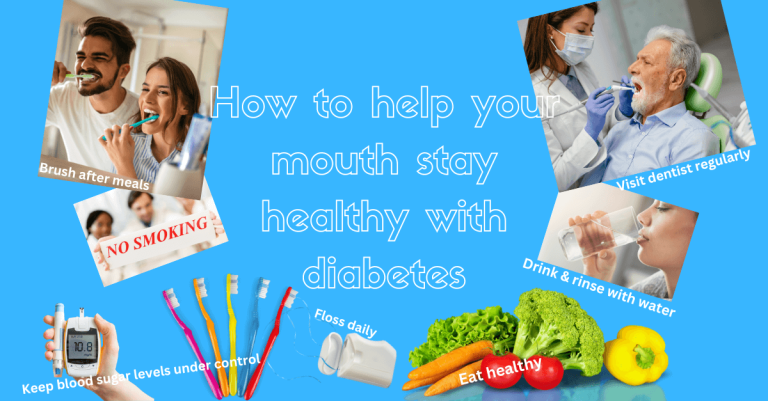Did you know that high blood sugar can take a toll on your mouth, teeth, and gums? Whether you have type 1 or 2 diabetes, taking care of your blood sugar levels is key to better health, as you well know. But taking care of your mouth at the same time will help fight off any possible oral complications that can happen with diabetes. Learn what to look for and how to take charge today!
Here are 7 ways Diabetes can affect your oral health:
- Tooth loss – 1 in 5 causes of tooth loss is linked to diabetes.
- Gum disease – research shows that your blood sugar can cause gum disease if it’s not under control.
- Cavities – you are at a higher risk of getting more cavities
- Dry Mouth – you may have less saliva which can cause cavities.
- Change in taste or persistent bad taste – your taste can change and you may add more sugar or spices to things to try to make up for it, which can cause cavities and affect your diet.
- Thrush Infections – your immune system can be affected which makes you more vulnerable to yeast infections. Thrush can also cause a burning sensation in your mouth.
- Slow healing – your wounds or cold sores in your mouth can be very slow in healing.
What can you do about this?
The good news is you can do something about it.
Take your dental health seriously with proper daily care.
Monitor your sugar levels and follow your doctor’s instructions.
Brush and floss your teeth at least 2 times a day, especially after meals and snacks.
Other things you can do to help keep your mouth healthier:
- Make sure your dentist knows you have diabetes
- See your dentist at least once a year, preferably twice a year
- Bring your dentist a list of medications that your are taking
- Be on the lookout for early signs of gum disease
- Don’t smoke
- Use a soft bristle toothbrush or electric toothbrush
- Avoid vigorous or hard tooth scrubbing with your toothbrush
- Get a new soft bristle toothbrush at least every 3 months
- Floss daily
- If you have dentures, make sure to take them out and clean them daily
- Rinse your mouth with water after meals or snacks if you can’t brush
- Drink plenty of water
- If you have an abscess or other acute infection that develops suddenly, you need to be treated right away
- Remember that healing will take longer and follow your dentist’s instructions closely

What are the early signs of gum disease or gingivitis?
When sugary or acidic foods stay in your mouth by sticking between or on your teeth and gums, this causes bacteria to grow. Bacteria creates plaque, which causes cavities and gum disease. Your gums may become swollen and bleed easily. Since diabetes lessons your ability to fight off bacteria, gum disease may be more severe because of your lowered resistance to infection and slow healing. In addition, gum disease can also cause your blood sugar levels to rise which makes it harder for you to control those levels.
Advanced Gum Disease
Advanced gum disease is known as periodontitis. It is a more serious infection that can destroy the soft tissues and bones that support your teeth. It will eventually cause your gums and jawbone to pull away from your teeth, which in turn, may cause your teeth to fall out.
Misconception:
You are doomed to have oral health issues if you have type 1 or type 2 diabetes.
Fact:
https://midcitiesdental.com/contact-us-today/If you take good care of your oral health and keep your blood sugar levels under control, you will not have problems with your mouth, gums, or teeth either.
We are here to help and advise you on how to have the best oral health possible. Please let us know if you have any questions concerning the best care you can get if you have diabetes. Make sure to schedule your next appointment soon!

Your insurance company may have a benefit deadline of December 31.
Therefore, you may need to use up your dental plan benefits before then as they will not roll over into the New Year.
Still, some plans may end at different times of the year.
Check your plan to be sure.

